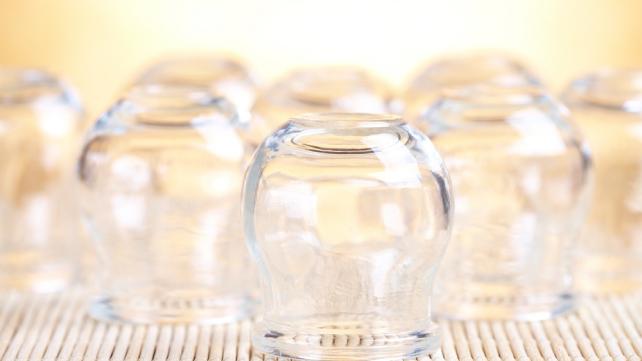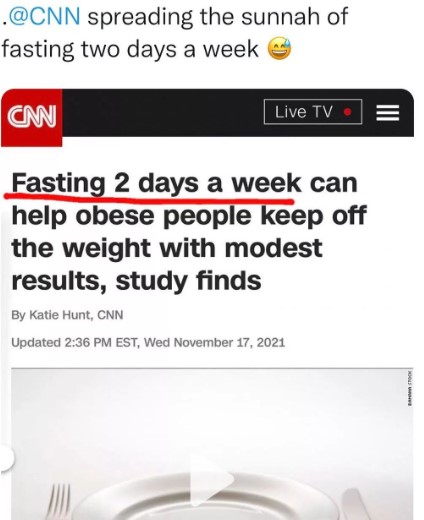
It seems like every time I open social media, there is a string of news articles or images denoting some “recent” discovery that Muslims have already been putting into practice for hundreds of years. One claim was recently shared on an Instagram page dedicated to halal humor, with the title, “Laughs in Muslim,” indicating the absurdity of such declarations. Just like the above-the-ankle Sunnah pant fads, hipster beards, and obsession with henna, Islamic practices have found their way into popular culture.
Since the 7th century, adherents to Islam have been following the example and teachings of Prophet Muhammad, peace and blessings be upon him. He not only provided spiritual guidance, but also a living manual on how to effectively complete the most mundane of tasks from brushing one’s teeth to eating and drinking. Yet somehow, his guidance has been appropriated by mainstream culture and repackaged as breakthroughs in modernity.
Here are just some of these innovations that are not so new, but Sunnah:
1. Waking up early
Many productivity gurus attribute their success to waking up early to take advantage of the full day. As the popular saying goes, “The early bird gets the worm.” Muslims have always understood the value of waking up early. In fact, it is an obligation to wake up before sunrise to pray Salat al-fajr. The Prophet, peace and blessings be upon him, was an early riser who would spend his mornings in worship and reflection. Undoubtedly, he was the most productive and influential figure in his time, and his legacy will continue until the Day of Judgement. His companion, Sakhr ibn al-Ghamidi, may Allah be pleased with him, reported that the Messenger of Allah said:
“O Allah, bless my nation in their early morning.”
(Sunan al-Tirmidhi)
2. Cleaning the teeth with the miswak
The environmentally conscious are always looking for sustainable alternatives to modern tools that negatively affect the environment. The overuse of plastics and the waste they produce is a real problem for the Earth and its living organisms. It is no surprise, then, that scientists have just “discovered” the benefits of the miswak on oral health. A recent study in November 2020, found that “oral hygiene and gingival health may be improved by complementing miswak chewing sticks with toothbrushing.”1
The siwak or miswak is a stick from the Salvadora Persica plant used as a toothbrush in regions of Africa and Asia. Because of its natural origin, the miswak is a sustainable alternative to plastic toothbrushes. It requires minimal processing and is biodegradable, making it the most eco-friendly way to keep your mouth fresh. The Prophet Muhammad, peace and blessings be upon him, kept his teeth clean with a miswak over 1400 years ago.
A companion asked his wife, Aisha, may Allah be pleased with her:
“‘What was the first thing the Prophet, peace and blessings be upon him, did when he entered his house?’” Aisha said, “‘Use the toothstick.’”
(Sahih Muslim)
He also recommended his followers to use the miswak often. He is reported to have said:
“You must use the toothstick, as it is pleasant for the mouth and pleasing to the Lord.”
(Musnad Ahmad)
He also said:
“Were it not hardship for my nation, I would have commanded them to use the toothstick with every prayer as they perform ablution.”
(Musnad Ahmad)

3. Sitting while drinking water
A recent social media post illustrated the importance of sitting while drinking water, claiming that in the sitting position, organs retain the water longer. Some health experts suggest that drinking water in a seated position allows for better digestion and absorption.2 These statements should come as no surprise to us, as Muslims. We read that on one occasion, the Prophet, peace and blessings be upon him, said:
“None of you should drink water while standing…”
(Sahih Muslim)
The Prophet, peace and blessings be upon him, had a customary practice of drinking water while seated, and recommended the same for his followers. However, there are reports in the authentic narrations of Bukhari and Muslim that mention instances where he drank while standing. It is important to note that these hadiths do not contradict or invalidate one another. The Prophet's act of occasionally drinking water while standing aimed to clarify its permissibility.
Sheikh Ibn al-Qayyim, may Allah have mercy on him, said, explaining the negative effect of drinking whilst standing and the importance of drinking whilst sitting:
“Drinking whilst standing has numerous negative effects, one of which is that it does not fully quench the thirst and does not settle in the stomach so that the liver can distribute the nutrients to other parts of the body. Rather it comes to the stomach with speed and force, and there is the fear that it will cause a chill or disturbance and may pass quickly to the lower parts of the body without moving gradually. All of that is harmful to the drinker, but if he does it occasionally or in the case of need, it will not harm him….” (Zaad al-Ma‘aad, 4/229)
4. Minding your posture while eating
Speaking of drinking while standing, let us discuss what the Prophet Muhammad, peace and blessings be upon him, said about the proper posture while eating. Anas ibn Malik, may Allah be pleased with him, reported that:
The Prophet prohibited a man from drinking while standing up. He said the companions asked him, “And eating?” The Prophet said, “That is even worse.”
(Sahih Muslim)
From this hadith, we understand that it is better to sit while eating, but what about breakfast in bed or snacking while laying down? The companion, Abu Juhayfah, may Allah be pleased with him, reported:
The Messenger of Allah, peace and blessings be upon him, said, “I do not eat while reclining.”
(Sahih Bukhari)
It is not a shock, then, to know that according to an article in Healthline, our eating position can impact our body’s ability to efficiently digest food. The studies mentioned confirm that an individual's posture can influence the speed of digestion, with slower digestion observed when lying down and faster digestion when standing up and engaging in movement. The duration required for the body to digest food can have implications for overall health. Additionally, consuming food while in a standing position and engaging in physical activity may result in increased appetite that can lead to overeating.3
5. Eating moderately
The Prophet Muhammad, peace and blessings be upon him, not only offered wisdom on how to sit while eating, but also on how much to eat. In a very famous hadith, he said:
“The son of Adam cannot fill a vessel worse than his stomach, as it is enough for him to take a few bites to straighten his back. If he cannot do it, then he may fill it with a third of his food, a third of his drink, and a third of his breath.”
(Al-Tirmidhi)
Every diet fad mentions that the key to losing weight is portion control. However, for many of us, it is easier said than done. Our busy lifestyles, readily available fast food, and prepackaged on-the-go snacks have steered us into vicious cycles of overconsumption. Unfortunately, an obesity epidemic in the U.S. has led to an increase in bariatric surgery and other invasive weight loss procedures to help patients achieve a healthy weight.
According to the National Institutes of Health (NIH), the sleeve gastectromy is the most popular of these medical procedures.4 The sleeve gastrectomy or gastric sleeve is a bariatric surgery that induces weight loss by reducing the size of the stomach. Doctors remove approximately 80% of the stomach, leaving behind a narrow “sleeve” of stomach. Patients are then limited to eating about a cup of food after full recovery, which can take up to twelve months.
Other options for overweight patients are gastric bypass surgery, oral medications to suppress appetite, and temporary gastric balloons – literal balloons that are inserted to take up space in the stomach and limit food intake. None of these methods and procedures are without serious risks.
Following the wisdom of the Prophet Muhammad, peace and blessings be upon him, and limiting our portions to just enough to keep us going, would help us avoid having to take such drastic measures to maintain a healthy weight.
Note: Not all obesity is caused by overeating. Being overweight can be caused by genetic factors, chronic diseases, psychological problems, medications, and more. Please be compassionate with those people you encounter struggling with their weight and never shame anyone about their body.

6. Fasting
Another new weight loss trend celebrities, physical trainers, and athletes swear by is intermittent fasting. This alternating schedule of abstaining from food and drink during certain hours of the day and days of the week, is similar if not the same as what many Muslims all over the world do on a regular basis. According to Johns Hopkins Medicine, research shows fasting for a certain number of hours each day or eating just one meal a couple days a week may have health benefits.5
Intermittent fasting extends the duration between meals, allowing the body to utilize the calories consumed in the previous meal and subsequently transition to burning stored fat for energy. One of the most popular methods of intermittent fasting are the 16:8 – fasting for 16 hours and eating within an 8-hour window. Sound familiar? These timings are like typical Ramadan fasting hours in the U.S.
Another popular trend is to fast every other day of the week. Interestingly, the Prophet Muhammad, peace and blessings be upon him, used to fast every week on Mondays and Thursdays, as well as three consecutive days out of the month (typically called the “white days” or the 13th, 14th and 15th of the lunar month) in addition to the month of Ramadan, and other voluntary fasts during the year. Additionally, he is reported to have said:
“Verily, the most beloved fasting to Allah is the fasting of David and the most beloved prayer to Allah is the prayer of David, upon him be peace. He would sleep half of the night and stand in prayer for a third of it and then sleep for a sixth of it. He would fast every other day.”
(Sahih Bukhari, Sahih Muslim)
7. Sitting while urinating.
On May 26, 2023, The New York Times published an article with the title, “I’m a urologist — men have been peeing the wrong way!” Of course, I had to read it, and sure enough, Dr. Gerald Collins, a top urological surgeon from England, has “discovered” that it is healthier and more hygienic to sit down while urinating. As it turns out, urinating while sitting is considered more effective for emptying the bladder due to the complete relaxation of the muscles in the pelvis and spine. Of course, we know that it is an Islamic customary practice for both men and women to sit while urinating in most cases. The wife of the Prophet, Aisha, reported:
“The Prophet, peace and blessings be upon him, would not urinate unless he was sitting.”
Imam Al-Tirmidhi, in his collection, added that, “The prohibition of urinating while standing means it is a matter of etiquette and not absolute forbiddance.”
(Al-Tirmidhi)
8. Earthing
It was reported that a man from the companions of the Prophet, peace and blessings be upon him, traveled to Fadaalah bin ‘Ubayd (another companion), may Allah be pleased with him, while he was in Egypt. He wanted to inquire the details about a hadith they both heard. During their meeting, he noticed that Fadaalah was not wearing anything on his feet. He asked him, “Why don’t I see any shoes on you?” Fadaalah said: “The Prophet, peace and blessings be upon him, used to command us to go barefooted sometimes.” (See the entire authentic hadith in Abu Dawud #3629 for more details.)
What the Prophet, peace and blessings be upon him, commanded his companions to do is now a popular practice called “earthing.” Earthing, also known as grounding, involves the act of placing one's bare feet directly on the ground as a means of promoting health (in other words, going barefoot!). By being barefoot, the body can potentially absorb electrons from the Earth, which is believed to provide various health advantages. Advocates of earthing claim to have experienced positive effects on both their physical and mental wellbeing through this practice.6
9. Hijama or cupping
If you follow any type of sports live, on social media, or on television, then you would know more and more athletes are relying on the practice of hijama or cupping between sporting events. Sports stars from NBA players to Olympic gymnasts to MMA fighters rely on this practice to stay in the best state of health. Hijama involves placing cups on the skin and creating suction to promote healing and relieve various conditions. It has numerous healing benefits for the body, including increasing blood flow, removing toxins from the body, relieving inflammation, and boosting immunity.7
It is no wonder that it was recommended by the Prophet Muhammad, peace and blessings be upon him, who said:
“Verily, the best practice with which you treat yourselves is cupping.…”
(Sahih Bukhari)
10. Cleaning oneself with water after using the bathroom
The use of a bidet, spray hose, or pouring water on oneself from a pitcher after using the bathroom has become increasingly popular in the U.S. Although it is not new to the Western world, with many European nations adopting the practice, Muslims have been in the habit of washing their private parts with water after answering the call of nature way before it became trendy.
Aisha reported that the Messenger of Allah, peace and blessings be upon him, said:
“Ten acts are part of natural instinct: trimming the moustache, letting the beard grow, using the toothstick, sniffing water into the nose, clipping the nails, washing the knuckles, removing hair from the underarms, shaving the pubic hair, and cleaning the private parts with water.”
Mus’ab (the narrator) said, “I forgot the tenth, except that it might be rinsing the mouth.”
(Sahih Muslim)
Many of the Sunnah practices that have been newly discovered and popularized are mentioned in the above hadith. Some we have mentioned and some we have not (let’s not even get started on the Neti Pot or Navage!). The point is that these new findings have been part of our rich tradition since the lifetime of our beloved Prophet Muhammad, peace and blessings be upon him. They are a testament to his prophethood and the trustworthiness of his message.
All praise is to Allah who sent us the best of humanity to guide us in every affair even before it became stylish.
End Notes:
2 Side effects of drinking water while standing | HealthShots
3 Is Eating While Standing Up Bad for You?
4 Which Bariatric Procedure Is the Most Popular in the World? A Bibliometric Comparison
5 Intermittent Fasting: What is it, and how does it work? | Johns Hopkins Medicine
6 Have you heard of 'grounding' or 'earthing'? What it is and why it's getting attention.
Wendy Díaz is a Puerto Rican Muslim writer, award-winning poet, translator, and mother of six (ages ranging from infant to teen). She is the co-founder of Hablamos Islam, a non-profit organization that produces educational resources about Islam in Spanish (hablamosislam.org). She has written, illustrated, and published over a dozen children’s books and currently lives with her family in Maryland. Follow Wendy Díaz on social media @authorwendydiaz and @hablamosislam.



Add new comment